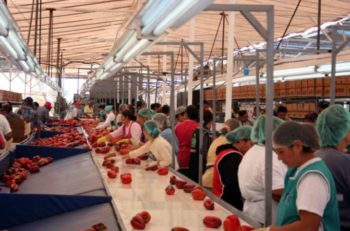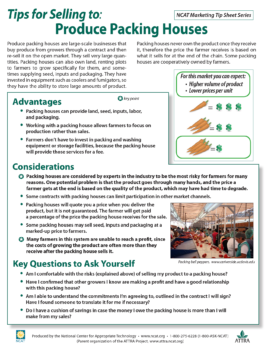Tips for Selling to Produce Packing Houses
NCAT Marketing Tipsheet Series
By Marisa Alcorta, Rex Dufour, and Tammy Hinman, NCAT

Packing bell peppers. Photo: ucdavis.edu
Produce packing houses are large-scale businesses that buy produce from growers through a contract and then re-sell it on the open market. They sell very large quantities. Packing houses can also own land, renting plots to farmers to grow specifically for them, and sometimes supplying seed, inputs and packaging. They have invested in equipment such as coolers and fumigators, so they have the ability to store large amounts of product. Packing houses never own the product once they receive it, therefore the price the farmer receives is based on what it sells for at the end of the chain. Some packing houses are cooperatively owned by farmers.
For this market you can expect:
- Higher volume of product
- Lower prices per unit
Advantages
- Packing houses can provide land, seed, inputs, labor, and packaging.
- Working with a packing house allows farmers to focus on production rather than sales.
- Farmers don’t have to invest in packing and washing equipment or storage facilities, because the packing house will provide those services for a fee.
Considerations
Packing houses are considered by experts in the industry to be the most risky for farmers for many reasons. One potential problem is that the product goes through many hands, and the price a farmer gets at the end is based on the quality of the product, which may have had time to degrade.
- Some contracts with packing houses can limit participation in other market channels.
- Packing houses will quote you a price when you deliver the product, but it is not guaranteed. The farmer will get paid a percentage of the price the packing house receives for the sale.
- Some packing houses may sell seed, inputs and packaging at a marked-up price to farmers.
- Many farmers in this system are unable to reach a profit, since the costs of growing the product are often more than they receive after the packing house sells it.
Key Questions to Ask Yourself
- Am I comfortable with the risks (explained above) of selling my product to a packing house?
- Have I confirmed that other growers I know are making a profit and have a good relationship with this packing house?
- Am I able to understand the commitments I’m agreeing to, outlined in the contract I will sign? Have I found someone to translate it for me if necessary?
- Do I have a cushion of savings in case the money I owe the packing house is more than I will make from my sales?
Tips for Selling to Produce Packing Houses
Ask other farmers about the reputation of the packing house before you work with them.
- Packing houses always have a contract. Be sure that you understand it, keep a copy, and have someone translate it for you if necessary.
- If there is a concern about product quality, get a third-party quality inspection. For a fee you can have your produce inspected by the Agricultural Marketing Service (AMS) before you deliver it to the packing house. See the Resources section below.
- Request a written receipt when you drop off your product. Make sure the person who takes your boxes signs the receipt and prints their name legibly. A receipt should include what you sold, the weight or number of boxes, the date it was delivered, and the quality grade.
- Depending on one market can be risky. Consider investigating other market channels. See other Marketing Tip Sheets in this series.
Resources
The Packer is a weekly newspaper covering fruit and vegetable news, produce shipping, distribution, packing, marketing, and trends in fresh produce in North America.
Wholesale Success: A Farmers Guide to Selling, Post Harvest Handling, and Packing Produce is a 255-page manual about the wholesale produce industry, with details on building relationships, food safety, grading standards, filling orders, record keeping, and billing. The manual includes harvesting, cooling, storing, and packing information for 103 different fruits and vegetables.
AMS Fresh Fruit, Vegetable, Nut, and Specialty Crop Grade Standards lists the U.S. Agricultural Marketing Service grade (quality) standards for each fruit, vegetable and nut sold as commodities.
AMS Inspection Service will inspect your produce and certify its grade of quality before you sell it.
Community Food Security Liability & Food Safety (in English and Spanish). This short brochure summarizes some of the issues regarding food safety when selling to institutional markets. It gives the reader information on what to expect for insurance requirements and how to better protect your farm.
USDA Terminal Market Report lists current wholesale prices.
Rodale Institute Organic Price Report can be configured to show organic only or to compare organic and conventional wholesale prices at the current market rates. Prices of fruit, vegetables and grains are listed for six different wholesale terminals across the U.S.
UC Davis Small Farm Program Wholesale Market Resources explain wholesale buyers and terminal markets.
Tips for Selling to Produce Packing Houses
© 2012 National Center for Appropriate Technology—NCAT
By Marisa Alcorta, Rex Dufour, and Tammy Hinman, NCAT
IP433
This publication is produced by the National Center for Appropriate Technology through the ATTRA Sustainable Agriculture program, under a cooperative agreement with USDA Rural Development. This publication was also made possible in part by funding from USDA/NIFA/OASDFR. ATTRA.NCAT.ORG.

